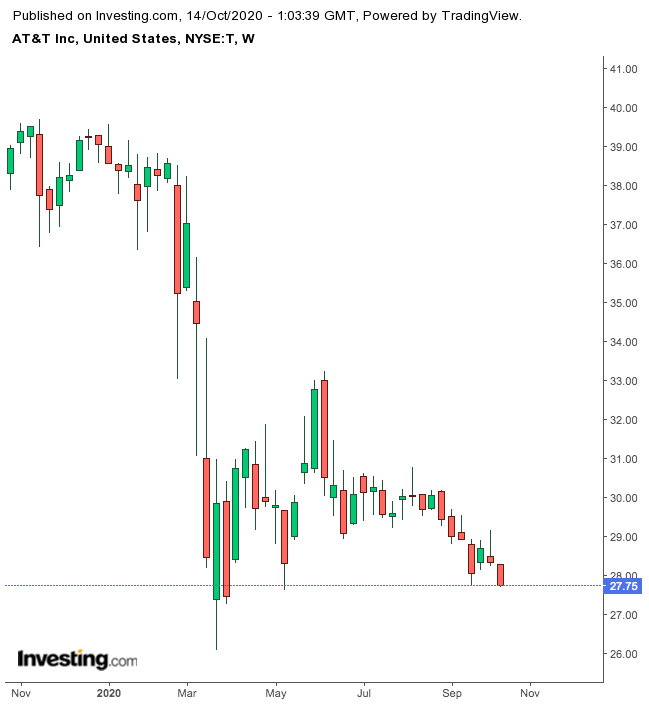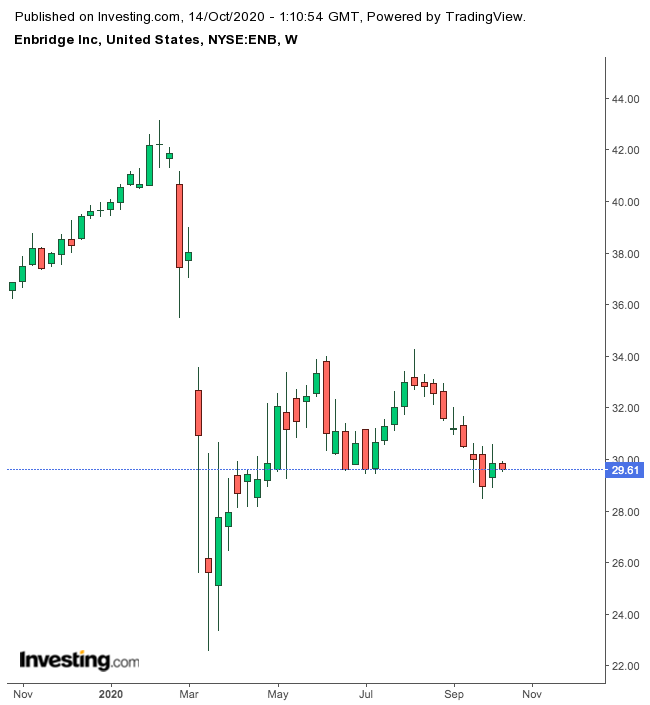When a dividend stock offers a yield much higher than the market average, it’s usually a sign of danger.
A higher yield often indicates payouts are at risk of being slashed down the road. Companies that are in the middle of a turnaround, or facing short-term disruptions, usually fall into this category. In a typical turnaround situation, companies try to cut their massive debt, or they’re dealing with a scenario where disruptors are endangering their market share.
For investors interested in trying their luck in this area of the market, though, here are our two picks to consider:
1. AT&T
America’s largest telecom operator, AT&T (NYSE:T), is a high-reward, albeit potentially high-risk bet for retirees. With an annual dividend yield of 7.39%, it offers one of the best returns available from a blue-chip stock with a long track record of paying dividends.
But that return doesn’t come without risk. Shares of the Dallas-based company have lost more than a quarter of their value since the start of the year as investors see significant uncertainty about this iconic brand as its core operations struggle to produce growth, and the company accumulates a huge load of debt. Shares were trading at $27.75 at yesterday's close

Since the COVID-19 outbreak, the operator is under significant pressure as many customers stop paying their bills, further straining its cash flows. In July, AT&T said 338,000 regular mobile-phone subscribers stopped paying for their service due to the COVID-19 crisis.
The company said an additional 159,000 broadband customers and 91,000 TV subscribers also stopped payments in the second quarter. AT&T and other carriers have vowed not to shut off service to people affected by the viral crisis.
AT&T’s dismal performance over the past five years is also a reflection of the company’s debt-loaded acquisition strategy, which has so far failed to unlock value. Its DirecTV unit has lost millions of subscribers in recent years as viewers switch to on-demand entertainment services like Netflix (NASDAQ:NFLX).
The communication services company bought the satellite TV provider for $49 billion in 2015, a deal that could hardly fetch $20 billion, according to the Wall Street Journal. In 2018, AT&T’s $80-billion takeover of Time Warner added HBO, the Warner Bros. film studio and cable channels like CNN to its portfolio.
For investors, the decision at this point is whether AT&T will successfully transform its business and be able to compete with entertainment sector disruptors like Netflix, and whether such a success would save its $0.52-a-share quarterly payout.
2. Enbridge
Utilities are another area where investors can find higher dividends and a good income stream if they hold for the long run. North America’s largest gas and oil pipeline operator, Enbridge (NYSE:ENB) could be a good fit in this sector, with its massive moat and its crucial position in North America’s energy supply chain.
Enbridge's cash flows are well diversified across many businesses and geographies, helping the utility to weather the economic downturn better than other companies.
For instance, while the pandemic is hurting oil consumption across the board, Enbridge’s gas transmission, distribution and storage businesses, which account for about 30% of cash flows, are not expected to experience a meaningful impact from COVID-19.
While many energy companies reported losses in the second quarter, Enbridge delivered strong performance with adjusted EBITDA rising to CAD$3.3 billion (USD $2.5 billion), compared to CAD$3.2 billion (USD $2.4 billion) a year ago. The company expects 5% to 7% annual growth in payout per share through 2022.

This revenue stability makes Enbridge a good defensive stock to hold when the economic headwinds begin to churn. The company pays $0.62 a share quarterly dividend, with an annual yield of 8.37%.
Over the past three years, Enbridge has been carrying out a restructuring plan, selling assets, focusing on its core strengths, and paying down its debt. These measures are likely to benefit long-term investors whose goal is to earn steadily growing income.
But investors don’t see much value in owning energy stocks in this environment when demand for oil is depressed and the company is facing hurdles in its expansion plans from environmentalists. Enbridge stock, down 25% to date in 2020, closed at $29.61 yesterday in New York.
Bottom Line
Investing in turnaround situations can produce huge returns over time. But these companies certainly carry more risk, so investors should be very careful in deciding which high-yielding stocks to select.
